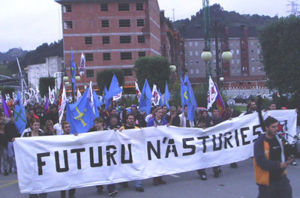- Darréu
-
Darréu - Mocedá Nacionaliego (Asturian for: Now - Nationalistic Youth) is a left-wing Asturian nationalist youth organization. It is based in the Asturias region of northwestern Spain.
Contents
Ideology
Darréu defines itself as a left-wing nationalist organization which tries to be the point of reference for the political movements of the left-wing asturian nationalist and independentist youth. The ideology of Darréu focuses on building a project based in youth activism to call for the recognition of Asturias as a nation and for the social rights of the working class.
Their militants can belong to the organization until they are thirty years old.
Organization outline and activity
Darréu is tied to the asturian nationalist party Andecha Astur and works as its youth section. In spite of its organic relationship with Andecha Astur, Darréu maintains total organizational independence, having its own departments of debate, participation, decision and treasury. It is organized by "conceyos" (city councils), that simultaneously decide in assemmbly the "national policy" in the "National Xunta" (National Committee).
Darréu periodically holds different political and cultural activities. Some of their most known activities are the Asturies nun escaez ("Asturias does not forget") commemorative concerts of the Asturian October 1934 Revolution, which from 2006 are integrated in the Día de la Mocedá Revolucionario ("Day of Revolutionary Youth"). This day is used by asturian left-wing nationalist parties for demanding social and nationalist policies. The Darréu demonstration of 2006 used the motto Futuru n'Asturies ("Future in Asturias").
From its foundation, the organization also participates in the manifestations of the Day of the Asturian Nation of Andecha Astur and in the one of First of May that is launched by SUATEA, CSI (Left Uninon Tendency) and CGT.
Darréu publishes the Írguite (Rise up) magazine, written totally in Asturian language, which features both cultural and political contents.
External links
See also

This article related to Asturias, Spain is a stub. You can help Wikipedia by expanding it.

